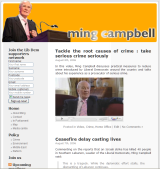Globalisation: Engaging in the World
Globalisation is the most unsettling and powerful agent of change in the modern world. Never before have our economies been so interdependent. Never before have jobs on one side of the planet been created, or destroyed, in such large numbers by events on the other side of the world.
Globalisation has altered the terms of trade for politicians. As our economy becomes ever more enmeshed in the international trading system, the ability of politicians to influence events beyond their grasp has been weakened. Globalisation is a great leveller. National Governments can do much to help citizens deal with the unsettling effects of globalisation – notably through education and lifelong learning so that new skills can be developed and new job opportunities exploited – but they should never pretend they can insulate people from an open international economy.
I am a lifelong internationalist. It has always seemed self evident to me that the pooling of some sovereignty at international level is necessary if Governments wish collectively to influence the world around them. Globalisation has made this need for collective, supranational decision making even more pressing. The new threats to our collective security – international terrorism, unstable or rogue states, weapons of mass destruction, cross border crime, and global climate change – demand a coherent international response.
The United Kingdom must remain committed to the web of international institutions which underpin our economic prosperity, support our ability to tackle global climate change, sustain our role in the international trading system, and enhance our military security. The EU, NATO, WTO and the UN are all part of a rules-based, multilateral system which must be built upon and reinforced if we are to deal with future threats and prosper in an increasingly fluid international environment.
It is one of the tragedies of British politics that Tony Blair’s fateful decision to side with George Bush in invading Iraq did so much to damage the international rule of law, and to discredit the United Kingdom in the eyes of our allies in Europe and beyond. That the Conservative Party appears stuck in an outdated and unthinking rut when it comes to international affairs has only made matters worse.
I will lead a party which will wear its internationalism on its sleeve. The old distinctions between foreign and domestic policy have been eroded. The environment, asylum and immigration, trade, crime, transport, defence, energy are both domestic and foreign. It used to be said that all politics is local. Now it is just as true to say that all politics is international. Few domestic policy decisions are immune from international influence.
I will reaffirm our commitment to the European Union as the most important institution in our response to these challenges. But I will be as much for the reform of Europe as I am for Europe itself. I will wish to promote reforms – political, institutional and economic – to strengthen the ability of the EU to act effectively and legitimately.



